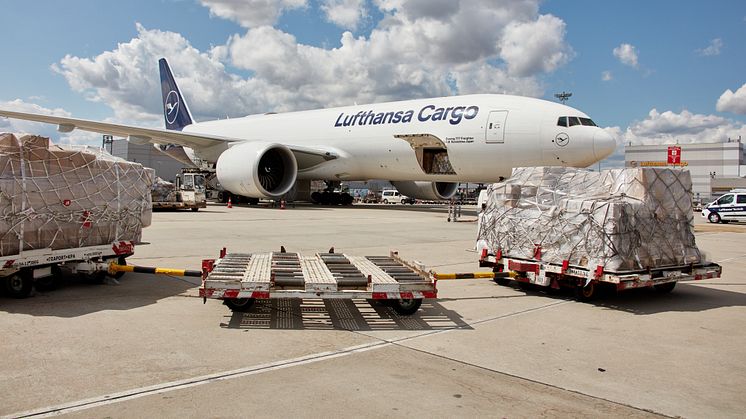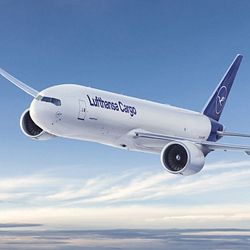
Press release -
The future of the airfreight industry: Lufthansa Cargo focuses on efficient sustainability, digitalization and e-commerce
- On Aviation Day (August 19th): Lufthansa Cargo names the future drivers of the airfreight industry
What does the future of the airfreight industry look like? Lufthansa Cargo is once again asking this question on this year's Aviation Day on August 19. A good time, because the industry is currently facing major challenges. "We are currently experiencing various upheavals within the airfreight industry. Sustainability, digitalization and booming online trade are playing a central role. In order to be able to master this, we are relying on decisive and dynamic action along with all stakeholders in the industry. This is the only way we can remain fit for the future and live up to our responsibility as one of the world's leading airfreight companies and enabling global business," says Ashwin Bhat, CEO of Lufthansa Cargo.
Strengthening the eCommerce business at Frankfurt Airport
Lufthansa Cargo recently presented its ambitious plans for Frankfurt Airport: In the future, the airport is to become one of the world's most important e-commerce hubs. Together with two subsidiaries - the logistics service provider heyworld and the customs clearance agency CB Customs Broker GmbH - Lufthansa Cargo is thus proactively driving forward the expansion of the eCommerce business at Frankfurt Airport. "A decisive success factor for online retailing is the resilience and speed of the supply chain. We want to make Frankfurt a leading location in this segment by offering holistic solutions for shipping, customs clearance, and onward transport of eCommerce shipments," said Ashwin Bhat. In addition, full-service customs agency CB Customs Broker announced a partnership with handling expert GEORGI Handling. To promote eCommerce business in Frankfurt, both companies are creating a new eCommerce terminal in Cargo City South, which will be another important base for the Asian market.
Expansion of the intra-European route network
Lufthansa Cargo has been serving destinations in the short- and medium-haul segment with A321F freighters for more than a year and put its third aircraft into service at the end of June. A fourth freighter will join the fleet as of September. With the A321 fleet doubling in size to four this year, there are new opportunities for capacity and route network expansion, whether in the scheduled or charter business. Currently, Lufthansa Cargo offers more than 50 weekly flights to 14 destinations, providing customers with a direct connection for their cargo to the hub in Frankfurt. The latest additions to the route network are Casablanca, Yerevan and Tunis. Further adjustments and extensions to the flight schedule on short- and medium-haul routes associated with the fleet expansion are currently still being planned to connect various economy centers.
Successful digitalization initiative launched with Kühne+Nagel on routes to Asia
A few weeks ago, Lufthansa Cargo, together with its long-standing and digitally affine customer Kühne+Nagel, succeeded in transporting 100 percent general cargo by electronic air waybill as well as the digital accompanying documents between Germany and Hong Kong. This first purely "paperless route" is the starting signal for the introduction of "paperless corridors" for efficient and resource-conscious transports between Europe and Asia.
Lufthansa Cargo invests in sustainable measures
Lufthansa Cargo is equally ambitious in the area of sustainability: By 2030 at the latest, the company wants to halve its carbon footprint compared with 2019 in order to operate CO₂-neutral by 2050. In this regard, Lufthansa Cargo plays a pioneering role within the industry, as can be seen, for example, in the implementation of the EU regulation ReFuelEU: In the latest confirmed Trilogue regarding the EU ReFuel Aviation Regulation a binding quota of renewable fuels for aviation has been defined: For example, at least two percent SAF must be used by 2025, and at least six percent by 2030. Compared to fossil fuels, SAF reduce CO₂ emissions by up to 80 percent. Today, Lufthansa Cargo is already achieving the first mark of two percent: In 2022, the SAF share in the fuel consumption of Lufthansa Cargo freighter aircraft was already 2.1 percent. In addition to renewable fuels, the company is also focusing on continuous fleet modernization, fuel efficiency and digitalization. "We see great potential in AI-based applications and have already integrated them into our services. From eBooking to eTracking, we now offer our customers extensive options along the transport chain. If we want to sustainably improve the industry's carbon footprint, we must use every opportunity to further reduce our CO₂ emissions," says Nicole Mies, Head of Communication and Corporate Responsibility at Lufthansa Cargo.
Topics
Categories
Lufthansa Cargo AG
With revenue of 4.6 billion euros and a transport performance of 7.2 billion freight ton kilometers in 2022, Lufthansa Cargo is one of the world's leading companies in the transport of airfreight. The company currently employs around 4,100 people worldwide. Lufthansa Cargo's focus is on the airport-to-airport business. The route network covers around 300 destinations in more than 100 countries, using both freighter aircraft and cargo capacity from passenger aircraft operated by Lufthansa, Austrian Airlines, Brussels Airlines, Eurowings Discover and SunExpress, as well as trucks. The majority of the cargo business is handled via Frankfurt Airport. Lufthansa Cargo is pursuing the goal of becoming the world's most environmentally friendly cargo airline. To achieve this, the company relies on state-of-the-art technologies and constant investments in the area of sustainability. In 2022, important milestones were reached, such as the investment in the continuous expansion of the B777F fleet, the expansion of short- and medium-haul networks with A321 freighters, and the continuation of the Sustainable Aviation Fuel program. In 2023, Lufthansa Cargo plans to successively equip its B777F fleet with Sharkskin technology, implement further digital services and contribute to reducing CO2 emissions through sustainable logistics solutions. Lufthansa Cargo is a wholly owned subsidiary of Deutsche Lufthansa AG and the specialist for the logistics business of the Lufthansa Group.






